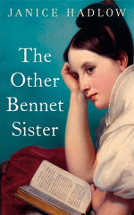The other Bennet sister by Janice Hadlow

Pan Macmillan, 2020. ISBN: 9781509842032. 320pp.
(Age: 15+) Highly recommended. Mary is the other Bennet sister, the
one we hear least about in Jane Austen's Pride and prejudice.
Jane and Lizzie, the two eldest are beautiful and intelligent, the
two younger ones, Kitty and Lydia, are vain and flighty, and Mary is
the one in the middle, the plain and serious one with her head in
books. Mary is the object of her mother's disdain, seen as the most
unattractive and least marriageable of her daughters, and even her
father spares little thought for her, Lizzie being his favourite.
Author Hadlow takes the character of Mary and retells Austen's story
from Mary's perspective. Part One is Pride and prejudice
retold, we remember key scenes and events but told by a different
narrator. This section of the novel would make an excellent focus
for the English curriculum study of appropriation and adaptation as
a literary device.
But then Hadlow goes further. She imagines what happens to Mary
after the ending of Pride and prejudice when the four other
sisters are all happily settled and secure in their marriages. Mary
is in an extremely untenable position with no home of her own, no
income, no marriage prospects, and parents that are embarrassed by
her. She moves from place to place staying in turn with sisters,
friends and relatives. She continues to read, the subjects more and
more intellectually demanding, and she observes the marriages of
others, gradually coming to an appreciation of the qualities that
make a good relationship. As she matures, she is fortunate to have
the encouragement of some who have an appreciation of her good
qualities and intellect, and there are even male companions who seem
to take an interest in her.
In Hadlow's story, Mary is the kind of heroine we find in Jane
Eyre, self-effacing and lonely, a plain but good natured,
intelligent woman who longs for the love and companionship of
someone who recognises her good qualities. She has to overcome the
humiliating experiences of her youth and eventually blossom into a
confident person who can take her place in society. Like Austen,
Hadlow has told a fascinating story that explores identity, love,
marriage, class and the role of women in the 19th century.
Helen Eddy